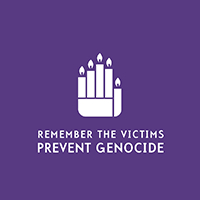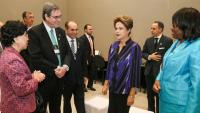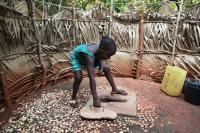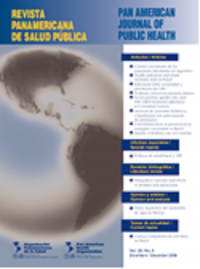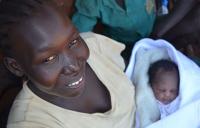You are here
News
-
12/09/2015 - In September 2015, the United Nations General Assembly established 9 December as the International Day of Commemoration and Dignity of the Victims of the Crime of Genocide and of the Prevention of this Crime. The 9th of December is the anniversary of the adoption of the 1948 Convention on the Prevention and Punishment of the Crime of Genocide (the “Genocide Convention”).
-
12/08/2015 - Investing the necessary public resources to achieve universal health is a social, political and economic necessity that should no longer be delayed, said participants in a forum organized by the Pan American Health Organization/World Health Organization (PAHO/WHO) today, in the lead-up to Universal Health Coverage Day, Dec.12.
-
12/04/2015 - First ever estimates of the global burden of foodborne diseases show almost 1 in 10 people fall ill every year from eating contaminated food and 420 000 die as a result. Children under 5 years of age are at particularly high risk, with 125 000 children dying from foodborne diseases every year. WHO African and South-East Asia Regions have the highest burden of foodborne diseases.
-
12/04/2015 - Experts on violence against women speaking at the Pan American Health Organization/World Health Organization (PAHO/WHO) today noted significant progress in domestic and international responses to violence against women. But they said that intensified and sustained efforts by both the health sector and other sectors will be needed to end the global epidemic of violence against women.
-
11/25/2015 - Unbeknownst to most of the 2,000+ delegates gathering for the start of the 2nd Global High-Level Conference on Road Safety in Brasilia last week, the Director-General of the World Health Organization (WHO), Margaret Chan, the Director of the Pan American Health Organization (PAHO), Carissa F. Etienne, and PAHO/WHO's country representative in Brazil, Joaquín Molina, were meeting with the President of Brazil, Dilma Rousseff to discuss topics which impact many countries in the Americas. The informal 10-minute meet and greet turned into a 40-minute conversation.
-
11/25/2015 - The first meeting of the Program to Strengthen Cooperation for Health Development in the America is taking place, this week, in the Palace Itaboray, in Petrópolis, Brazil. The Department of External Relations, Partnerships, and Mobilization of Resources of the Pan American Health Organization/Organization World Health (PAHO/WHO), with the support of the Oswaldo Cruz Foundation (Fiocruz), is developing a program to strengthen the capacities of the International Relations Offices (ORIS) in the Ministries of Health of the Region, as well as leading national actors of international health cooperation, based upon the recently approved Policy on Cooperation for Health Development during the PAHO/WHO's 52 Directing Council, in September 2013.
-
11/24/2015 - Lack of access to toilets is endangering millions of the world’s poorest children, UNICEF said today, pointing to emerging evidence of links between inadequate sanitation and malnutrition. Some 2.4 billion people globally do not have toilets and 946 million – roughly 1 in 8 of the world’s population – defecate in the open. Meanwhile, an estimated 159 million children under 5 years old are stunted (short for their age) and another 50 million are wasted (low weight for age). A report issued today, Improving Nutrition Outcomes with Better Water, Sanitation and Hygiene, from UNICEF, USAID and the World Health Organization, for the first time brings together years of research and case studies which demonstrate the link between sanitation and malnutrition. More importantly, it provides guidance for action.
-
11/19/2015 - The Pan American Journal of Public Health, published by the Pan American Health Organization (PAHO/WHO), announces a call for papers for an upcoming special issue on HIV/AIDS Prevention, Care and Treatment in the Region of the Americas: Achievements, Challenges and Perspectives, to be published by December of 2016 with support from the HIV, Hepatitis, Tuberculosis and STI Unit at PAHO and other regional partners.
-
11/18/2015 - The ministers of health of MERCOSUR and Associate States completed initial negotiations with a number of pharmaceutical companies on 13 November in Asunción, Paraguay, that will lead to the joint procurement of high-cost medicines, with the support of the Pan American Health Organization/World Health Organization (PAHO/WHO). In an initial round of negotiations, the ministers of health received an offer from the pharmaceutical company Gilead for an antiviral medicine against hepatitis C at the lowest price available in the region. Agreement was also reached on using the PAHO Strategic Fund for pooled procurement of an antiretroviral medicine to treat HIV/AIDS.
-
11/18/2015 - Updated figures released by the United Nations yesterday revealed that the global maternal death ratio has dropped 44 per cent since 1990. Yet too many women continue to die needlessly, and a majority of them are dying in countries afflicted by humanitarian crises or fragile conditions. Between 1990 and 2015, the annual number of maternal deaths fell from about 532,000 to 303,000, according to the latest figures released by UNFPA, the World Health Organization, the World Bank and the UN Population Division. The maternal death ratio fell from 385 deaths to 216 out of every 100,000 live births.

